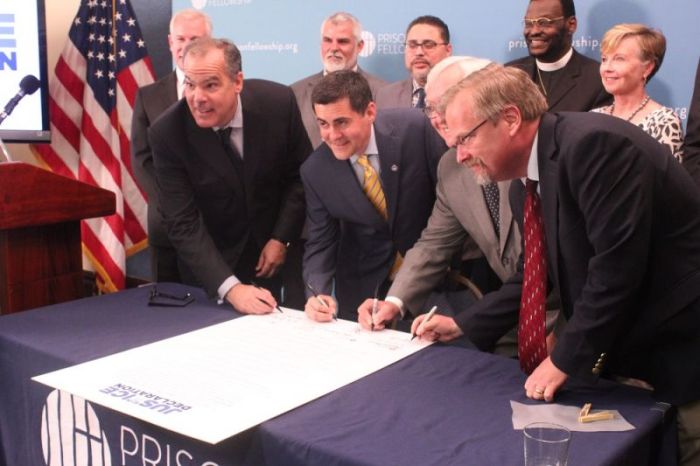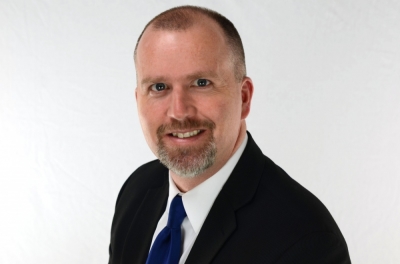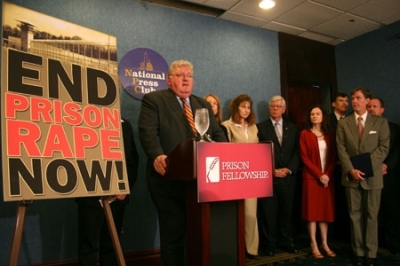Prisoners-Turned-Missionaries Describe Societal Barriers They Faced After Serving Their Time
A growing bipartisan reform effort

There is a growing bipartisan movement across the country to reform the nation's re-entry system to not only limit the barriers ex-inmates face upon release but to also provide them with the training and rehabilitation they need to succeed once they are out.
Thanks to Prison Fellowship and other activist organizations throughout the country, as many as 23 states — red and blue — enacted laws in 2017 that seek to limit restrictions and barriers faced by people with criminal records in the workplace and elsewhere in society.
According to the Collateral Consequences Resource Center, some of these laws expand the availability of relief while other laws create minor changes to existing laws that made it difficult for inmates.
Many of the laws involve "restrictions on public access to records" or place "limits on employer inquiries into criminal history."
Additionally, new record sealing schemes were passed by Illinois, Montana and New York. The CCRC notes that nine states either passed relaxed eligibility requirements for record sealing or made sealing or expungement more widely available.
At least six states have passed some form of re-entry reform in 2018 — Washington (HB 2638), Florida (HB 5001), Nebraska (LB 258 and LB 670), Illinois (SB 1607), Kentucky (HB 200) and Massachusetts (SB 2371).
"[T]he majority of states are currently wrapping up their legislative sessions (aside from a couple of legislatures who meet year-round)," Kate Trammell, Prison Fellowship's state campaign manager, told CP. "The movement will really begin to take place over the summer and fall as state policymakers begin to craft their legislative offerings for the next session."
Pat Nolan, director of the American Conservative Union Foundation Center for Criminal Justice Reform, told CP that while the federal government has been slow to act on prison reform, "states have moved way ahead."
"It started in 'tough on crime' Texas," Pat Nolan said. "They said, 'We're locking up a lot of up people that we're just mad at and we are not afraid of. Let's save money on that and get them into drug treatment programs or mental health services, job training under the supervision of the community. With the savings, then we have the money to do programs inside prison to really turn around the lives.'"
As a result, states like Texas, South Carolina, Georgia, Utah, Alaska and South Dakota have been able to pass reforms that have saved them billions of dollars. According to Nolan, Texas has closed eight prisons, saved $3 billion and has reduced its crime rate to the lowest point since 1967.
"All across the country, states have started to do this with remarkable results," he stated.
Nolan said the fact that so many states have enacted new policies is a "big news story that hasn't been covered."
"Simultaneously each of those states changed their own laws to focus on re-entry and giving people second chances," he explained. "It would be dangerous if it were increasing the crime rate and I wouldn't be for it. The fact of the matter is this has allowed the states to have lower crime rates than states that haven't adopted them."
At the federal level, Prison Fellowship executives and other criminal justice reform advocates are optimistic that one of the most substantial pieces of prison reform legislation in decades could be passed this year — The Prison Reform and Redemption Act.
"When the government funds hospitals, we want them to make people healthier. When government funds schools, we want them to make people smarter. We have gone for generations without that kind of accountability in the criminal justice system and we have accepted failure where as high as two-thirds of the people are returning after three years," Prison Fellowship Senior Vice President Craig DeRoche told CP.

DeRoche said the new bill, which is co-sponsored by several Democrat and Republican Congress members, would bring accountability for "success" to the federal level and "creates a goal of using incarceration to help the person re-enter successfully."
The legislation, if passed, would incentivize federal prisoners to participate in programs that focus on their individual problems, whether they need education, drug rehabilitation, treatment for sexual addiction, job training or treatment for anger management.
Upon assessment by the Department of Justice, certain programs would be individually recommended to prisoners. For participating in certain programs, eligible prisoners would earn their way to eligibility to finish their sentences under community supervision, or in halfway homes, or under home confinement.
The bill would appropriate $50 million per year from the Bureau of Prisons between 2018 to 2022 to offer such programs.
"The goal of the statutory design is for there to be individual risk assessment and then connect it with the program," DeRoche explained. "The goal is to say, 'What does this person need while he or she is in prison?' That is a huge change."
Study after study shows that many prisoners need to be taught better ways to process their problems other than reverting to crime, he maintained. Currently, most people who go into prison are treated with a "three-or-four-sizes-fits-all" mentality that "devalues human life."
"What I tell people is that for the person who committed the crime, the crime wasn't the problem; the crime was their solution to the problem," DeRoche said. "So to have them come up with a different set of solutions when faced with anger or fear or jealousy or other problems, that requires education and programming. I think a lot of people in our culture mistake the purpose of the programming, they assume that you start with job skills or a certificate or some sort of certification."
The legislation was introduced into the house by Reps. Doug Collins, R-Ga., and Hakeem Jeffries, D-N.Y. last year.
Prison Fellowship and a number of Christian organizations, including the Southern Baptist Convention's Ethics and Religious Liberty Commission, have signed onto a letter of support for the legislation this week. Hundreds of evangelical leaders, including Franklin Graham and James Dobson, have voiced their support for the legislation in another letter sent to Congressional leaders this week.
Although the bill was scheduled to be marked up by the House Judiciary Committee this past week, the mark-up was delayed on Wednesday.
Over 60 most left-leaning groups have stated their opposition to the bill because it does not include mandatory sentencing reform for nonviolent offenders and is "unlikely to achieve meaningful prison reform."
"Across the country, states that have enacted legislation containing both front and back end reforms have reduced rates of incarceration and crime," the letter sent to the House Judiciary Committee on April 13 reads. "Any legislation that addresses only back end reforms is doomed to fail in achieving these goals. Without changes to sentencing laws that eliminate mandatory minimums, restore judicial discretion, reduce the national prison population, and mitigate disparate impacts on communities of color, H.R. 3356 alone will have little impact."
The groups that voiced their opposition to the Collins-Jeffries bill include the Leadership Conference for Civil Rights, American Civil Liberties Union and the NAACP. The groups claim that too many drug and immigration offenders would be ineligible to receive time credits for participating in the recidivism reduction programs. They also argue that there aren't enough of those programs currently available to serve the federal prison population.
DeRoche admitted that if passed, the legislation will take time to be fully implemented.
"This is not something that will be effective a week after the bill is passed," he said. "It is a clear direction in the statute, which is different than a budget, which changes from one year to the next. This is in statute, saying, 'This is the future of the federal prison system.'"
"Prison Fellowship is very optimistic that these changes will be significant and that they will continuously improve as they are implemented, year upon year," he added.
If the bill were to pass, it would likely be signed by Trump, who issued a set of guidelines earlier this year that called for re-entry reform measures but did not call for sentencing reform.
"I think in the 20-plus years since I started working for [Prison Fellowship founder] Chuck Colson on these issues in 1996, this is the best chance that we have at the federal level for reform. There is a consensus of left and right," Nolan said. "The Senate is always difficult because they essentially give the minority party a chance to delay things. In this case, the minority party mostly agrees with us. This is probably the only issue that unites Newt Gingrich and Van Jones."

Nolan, a former member of the California State Assembly who served 25 months in prison on racketeering charges, was personally recruited by Colson to serve as an executive at Prison Fellowship upon his release from prison in the 1990s.
"There is the old saying that politics is the art of the possible. Chuck Colson would always remind us that the perfect is the enemy of the good," Nolan recalled. "I strongly support sentencing reform but there is enough opposition in Congress that it would block the legislation as has happened for years now."
Nolan said he thinks the decision is "wise" to "first concentrate on re-entry."
"That is something we all can agree on — second chances and preparing the men and women to return home," Nolan stressed. "We'll get that passed and show that it works and come back with the same coalition to say, 'Now we really need to address the inequities of the prison reform system.'"




























